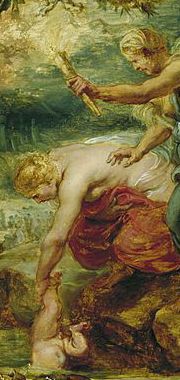|
Home
|
Jun 14, 2019
This week’s themePeople who have had multiple words coined after them This week’s words Socratic method Midas touch philippic herm Achilles' heel 
Goddess Thetis dipping her son Achilles in the River Styx (detail)
Art: Peter Paul Rubens, c. 1625 This week’s comments AWADmail 885 Next week’s theme People with multiple eponyms coined after them A.Word.A.Day
with Anu GargAchilles’ heel or Achilles heel
PRONUNCIATION:
MEANING:
noun: A seemingly small but critical weakness in an otherwise strong position.
ETYMOLOGY:
After Achilles, a hero in the Greek mythology. When Achilles was a baby,
his mother Thetis dipped him into the magical river Styx
to make him invincible. She held him by the heel which remained untouched
by the water and became his weak point. He was killed when the Trojan
prince Paris shot an arrow that pierced his one vulnerable spot: his heel.
After him, the tendon in the lower back of the ankle is also known as the
Achilles tendon. Earliest documented use: 1705.
NOTES:
The tendon connecting the calf muscles of the leg to the heel bone
is called Achilles tendon. The actor Brad Pitt played Achilles in the 2004
film Troy and tore his left Achilles tendon during production. Talk about
taking a role seriously!
USAGE:
“The danger of being seen as courting noxious supporters is a long-standing
worry for right-of-centre politicians. Preston Manning ... has argued that
it is the Achilles heel of the conservative movement.” John Geddes & Jason Markusoff; Target Andrew Scheer; Maclean’s (Toronto, Canada); Jun 2019. See more usage examples of achille’s heel in Vocabulary.com’s dictionary. A THOUGHT FOR TODAY:
The longest day must have its close -- the gloomiest night will wear on to
a morning. An eternal, inexorable lapse of moments is ever hurrying the day
of the evil to an eternal night, and the night of the just to an eternal
day. -Harriet Beecher Stowe, abolitionist and novelist (14 Jun 1811-1896)
|
|
Subscriber Services
Awards | Stats | Links | Privacy Policy
Contribute | Advertise
Awards | Stats | Links | Privacy Policy
Contribute | Advertise
© 1994-2026 Wordsmith